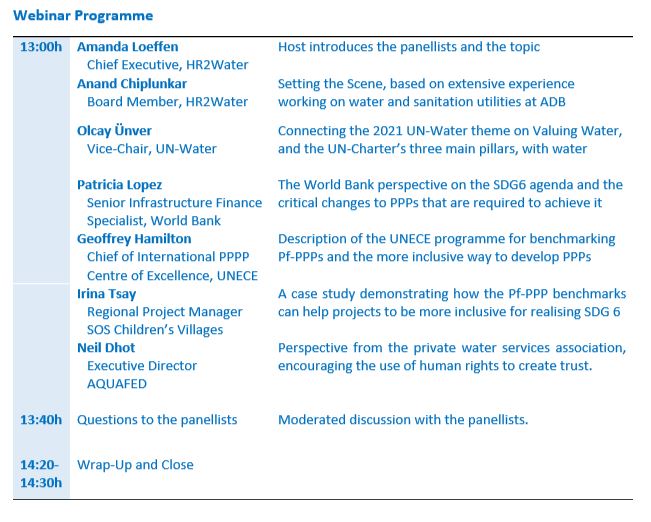In the race to realise the 2030 Agenda, the need for Public-Private Partnerships is recognised as essential to realise SDG 6, and yet people are still being left behind. The principles of a Human Rights Based Approach (HRBA) are not automatically included in the design and implementation stages of new projects.
People-first PPPs and a Human Rights-Based Approach for SDG 6
Webinar 5th August 2020, 13:00h-14:30h CET
Click here to register for attendance

Click here to read more about our panellists.
UNECE’s Pf-PPP programme seeks to find benchmarks and methodologies for introducing a more people-first approach, and to support the SDG agenda for leaving no one behind. As described by UNECE,
“People-first PPPs ensure that out of all stakeholders, ‘people’ are on the top. Its focus is on improving the quality of life of the communities, particularly those that are fighting poverty, by creating local and sustainable jobs, those that fight hunger and promote well-being, promote gender equality, access to water, energy, transport, and education for all, and that promote social cohesion, justice and disavow all forms of discrimination based on race, ethnicity, creed and culture. People first PPPs must expand in scale, speed, and spread with more people having access to better services at affordable prices.”
In addition, they should be evaluated along the lines of the following five criteria:
- Increasing access and promoting equity, which means that access to essential services, such as water and sanitation, energy etc. should be increased to people, especially to the socially and economically vulnerable. Furthermore, people-first PPPs should aim to promote social justice and make essential services accessible without restriction on any grounds, e.g. race, creed etc. to all;
- Improving environmental sustainability, cutting CO2 emissions to move to a green economy;
- Improving project economic effectiveness: projects must be successful, achieve value for money and have a measurable impact by removing a barrier or creating a new mechanism by integrating groups into the global market place;
- Be replicable so that PPPs project can be scaled up and achieve the transformational impact required by the 2030 Agenda. This criterion also needs to take into account whether the local staff and governments have received the necessary training to do similar projects going forward; and
- Engaging all stakeholders either directly involved in the PPP project or who might be affected directly or indirectly in the short and/or long run.
SDG 6 encourages governments to progressively realise safe and sustainable access for all people, including the most vulnerable and marginalised. Is this really going to be possible without a systematic change in approach and a rethink about how to structure the financing, management, design and operation of service provision?
Anand Chiplunkar (Board Member of HR2Water, and former Director, Urban Development and Water Division in the Central and West Asia Department of the Asian Development Bank) and Amanda Loeffen (CEO of HR2Water), both sub-group leaders in the UNECE program to introduce benchmarks for this evaluation, interview a selection of experts in the Public-Private Sector for water and sanitation services.



